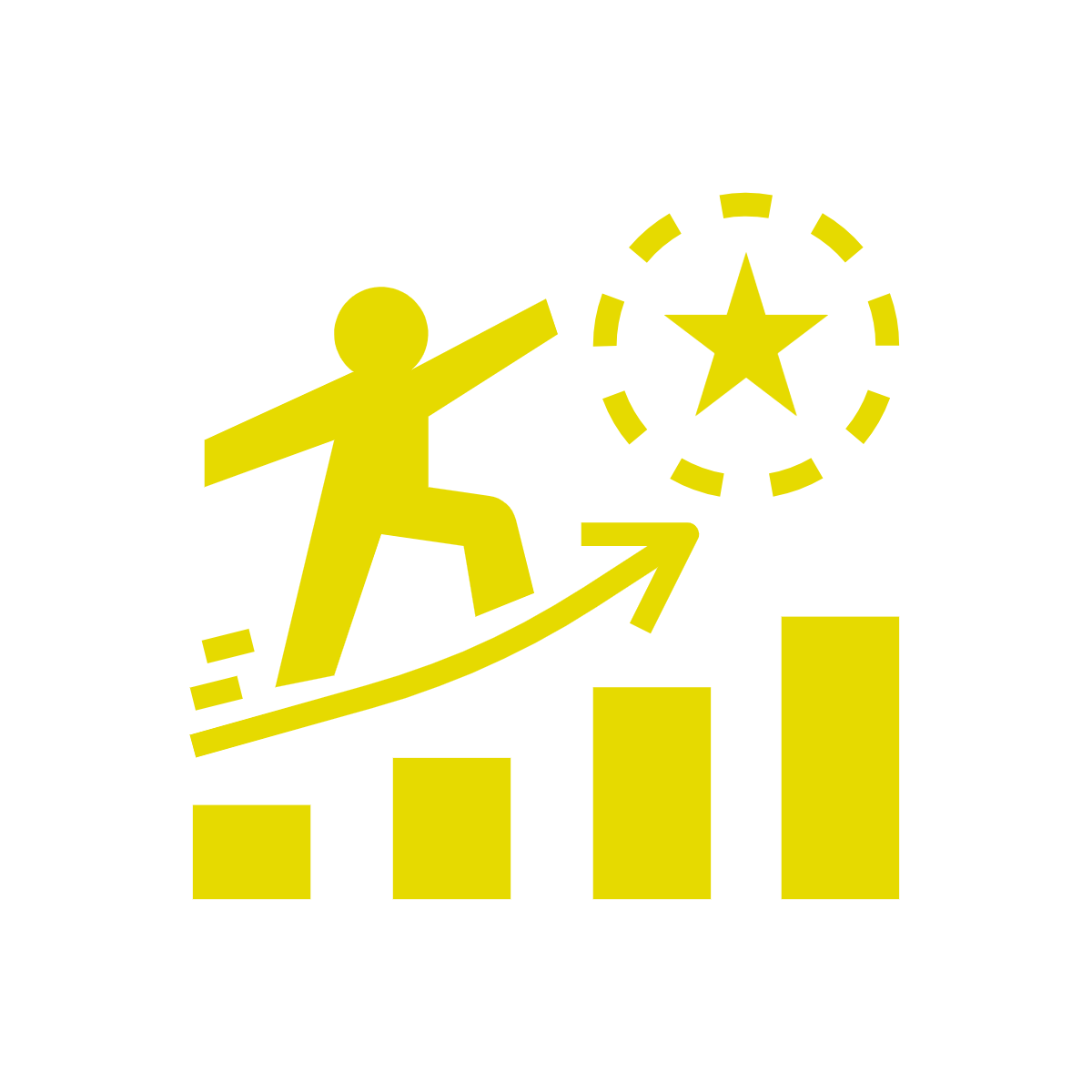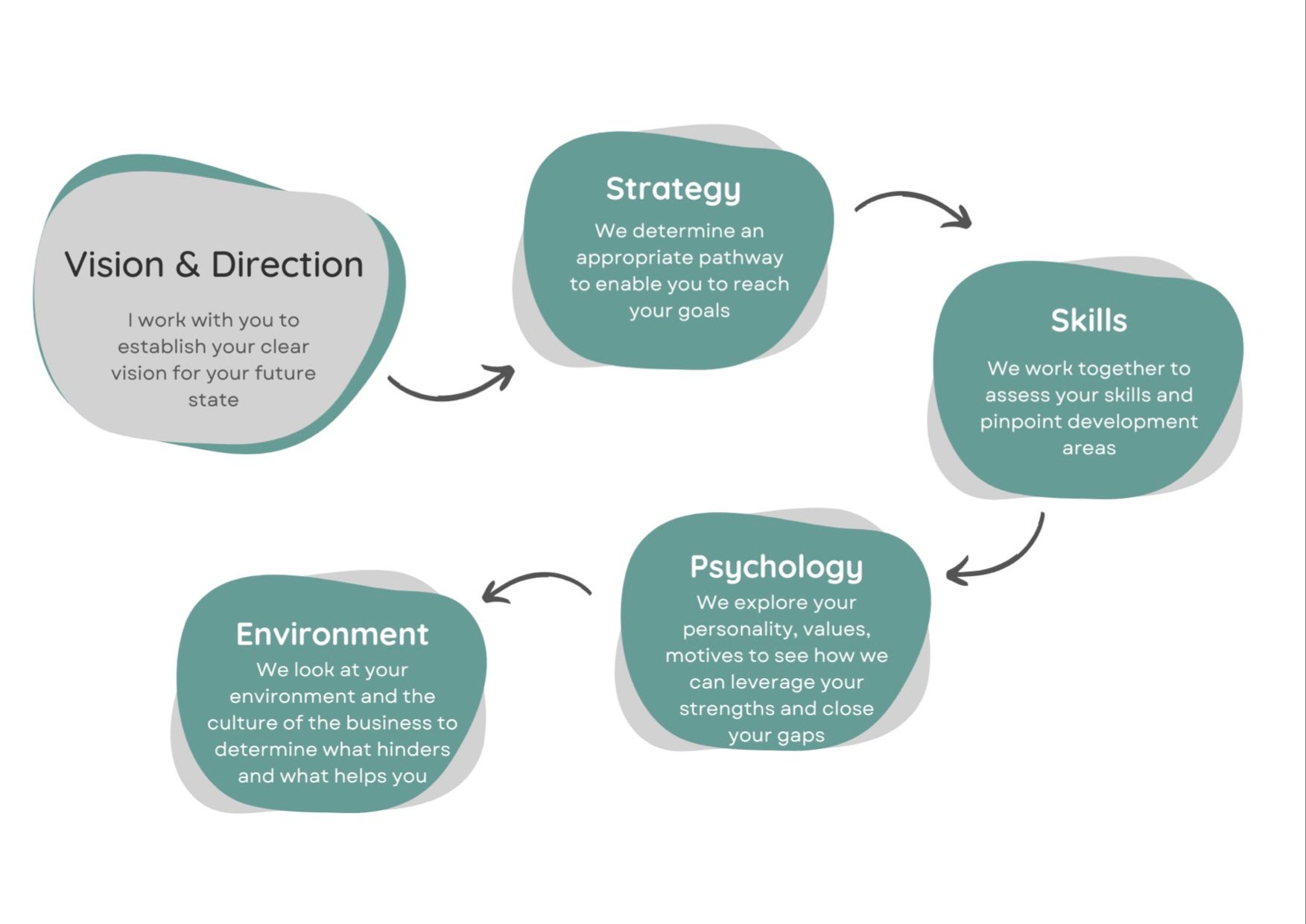Are you thinking about leadership coaching?
Here are 4 incredible benefits.
If you've been considering leadership coaching recently, you're not alone. Every day, high-performance leaders wonder whether executive coaching is the next step in their leadership journey. (6 mins 42s watch time).
Book Your Free 30 Minute Coaching Session* with Ros
Identify your unique qualities and bring out the best in yourself and your people.

Improve your leadership style, relationship building skills and personal positivity.

Develop your resilience and effectiveness in meeting the many demands of leadership.
Our coaching approach
- Vision and direction – we work with you to establish your clear vision for the future
- Strategy – we determine an appropriate strategy to enable you to reach your goals
- Skills – we assist you to assess your skills and pinpoint development areas
- Psychology – we thoroughly explore aspects such as your personality, your values, motives, and your emotional intelligence to see how we can leverage your strengths and close your gaps
- Environmental factors – we explore your environment and the culture of the business and determine what hinders and what helps you
All of this information informs a powerful action plan and a specific program of coaching, focussed on your individual requirements. I utilise the well-known GROW coaching model and a specific, action oriented and accountability based coaching approach to maximise the success of the coaching.

Our coaching packages
We have several coaching packages, with different inclusions depending on your needs. See which one is the best fit for you, and talk to us about tailoring one if you need to.
View coaching packagesDiagnostics and tools
Many of our coaching packages include various diagnostics and tools.
Read MoreTestimonials
Sash Busa
A big eye opener for me was how people perceive me versus how I am. That has changed. Without Ros’s support, it would have taken a long long time. I certainly wasn’t expecting a phonecall asking me to apply for a state manager position. Everything is due to Ros.
It takes a lot for me to be able to discuss my personal, professional development with somebody, talking about my future. That takes a lot of courage from me, but Ros made that very easy for me. She definitely understands what my needs are, what I wanted from this. She always starts a session with: ‘What would you like to talk about today?’. So she gives me a platform to come up with the goods. She has a good balance between what my present needs are, and what my future needs will be. She is looking at the next step and where I’m going. How I’m able to self-direct to get to where I want to. She challenged me on a few things, which I enjoyed and appreciated. She gave me a different perspective on my point of view.
Theresa Lord
There were a few specific work issues I wanted guidance with, and I wanted to see what I could do to improve myself at work and allow for opportunities for career progression. And that’s where I was so amazed by Ros – her breadth of experience as a coach.
I am beyond thrilled with the outcomes I got. She has instilled confidence in myself and my abilities, which is really what I needed. Her ideas, creative ability, and way she honed in on me as a person and what would work for me were fantastic.
I think Ros could coach anyone, to be honest. She is amazing. She has that ability to work out what’s right for you, and how to ask the right questions. Working with Ros over the last 6 months has been phenomenal. I’d recommend her to anyone who’s looking for coaching, because she can address anything!
Jennifer Lee
Through working with Ros I have been able to learn and understand much more about myself and how I operate, but also how that impacts on others (positively and negatively) as well as how I can make changes to get the best out of myself and also my team. In what has been a challenging year for me, it has been a blessing to have an independent sounding board who I can talk to about issues and situations and how best to manage them. While at times I feel a bit indulgent spending the time and money on myself I have found my sessions with Ros to be invaluable as they have allowed me to take stock of where I’m at, how I got here and what comes next. My coaching sessions with Ros have been an informative, challenging, entertaining and rewarding experience for me
Danie Miller
Sending a heartfelt thank you to Ros for our 1:1 coaching sessions. These sessions have been really significant in my professional growth and development. It didn’t matter what subject, concern or bubbling work scenario I talked to Ros about, she was able to help me reflect and link back to a logical theory that helped to put things into perspective. Each time I walked away from my sessions feeling focussed and equipped with new or refreshed tools and strategies to implement. Time well spent.
As a direct result of working with me, clients have achieved:
Five figure pay increases
Promotions to the C suite
More influence, making a REAL difference in the world
Sky high confidence
And more!
Frequently Asked Questions
What diagnostic tools do you use in coaching?
Can I have one off sessions, or do I need to commit to a coaching package?
Are you a coach or a mentor?
Is coaching only to fix problems?
Is coaching only for executives?
About Ros
Rosalind Cardinal is the Managing Director of Shaping Change, a consultancy specialising in improving business outcomes by developing individuals, teams and organisations.
Ros is a globally awarded facilitator and leadership coach, with a career in the Human Resources and Organisational Development field spanning more than 30 years. Ros' expertise spans leadership development, organisational culture, team building, change and transition management, emotional intelligence, organisational behaviour, employee engagement, strategic direction and management.
Ros is accredited in over 20 psychometrics and diagnostic tools, covering leadership behaviour, organisational culture, emotional intelligence, competencies, and more.
Ros is a Certified Member of the Australian Human Resources Institute, a member of the Australian Institute of Training and Development a Professional Member of the Australian Association for Psychological Type, and a member of the Australian Institute of Company Directors. She holds a Graduate Diploma in Human Resources and is a certified Neurocoach and Neuroleader.
In addition to Ros’ own blog, she is a regular contributing writer for Leaders in Heels, “Thrive”, and “People Development” Magazine.
Ros is a 2020 Telstra Business Women's Awards Finalist. Shaping Change was a finalist in the 2015, 2016, 2017, 2018, 2019 and 2020 Small Business Champions Awards, and Ros was a winner in the 2015 Australian Edupreneur Awards. In 2016, 2017, and again in 2018, Ros was awarded Leadership Coach of the Year – Australia by Corporate LiveWire in their Global Innovation and Excellence Awards. In 2016 Ros released her bestselling and award nominated book “The Resilient Employee: The essential guide to coping with change and thriving in today’s workplace”.

The demand for exceptional leadership is at an all-time high and executive coaching is the key to developing leaders that can function optimally in an environment of constant change and uncertainty.
Executive coaching is ideal for high-level executives who want to excel in their careers and take their teams and organisation to new heights. Business and organisational leaders have resorted to coaching when needing a broader perspective, have taken on more responsibility, or needed to lead more effectively.
Over the years, coaching has proven to be an effective tool to develop individuals that excel in a corporate environment.
What is Executive Coaching?
Executive coaching is a process whereby organisational leaders and other high-potential individuals are helped to develop greater self-awareness, hone their leadership skills, fine-tune personal and organisational goals, and address problem behavior.
In general, executive coaching help individuals to grow and succeed in leadership roles.
What Executive Coaches Do
The first thing to understand is that an executive coach is not a therapist and doesn’t provide counseling. This is not the role of a coach, although some coaches do have a background in counseling or psychology.
An executive coach doesn’t offer advice, but instead, helps individuals to gain their own insights by acting as a sounding board for them. They ask penetrating questions that help executives gain a clearer perspective and find their own solutions.
A coach will collaborate with the executive to find solutions to factors that are holding the executive back. Although the coach should have sound business experience, experience of the executive’s profession as such is not necessary. The coach is not there to make the executive a better engineer, but a better leader. That involves the creation of more self-awareness, setting personal and professional goals, and providing confidential and frank feedback.

Different Areas of Coaching
Apart from executive coaching, there are also other areas of coaching.
- Leadership coaching: The purpose of leadership coaching is to hone leadership competencies in organisational leaders. Leadership coaching helps leaders to achieve their goals and their potential. The coach is often someone who has experience as an executive leader themselves and therefore has insight into the unique challenges executive leaders face.
- Career coaching: Career coaching focuses on an individual’s career development. A career coach helps to identify what works for a person and what does not. The process might involve psychometric testing to gain deeper insight into the personality traits and strengths and weaknesses of the individual. The aim is to help the person to identify a career path that is likely to succeed for them.
- Organisational coaching: While executive and leadership coaching focus on the developmental needs of individuals, organisational coaching has to do with transformation across an organisation. Organisational coaching is often called upon to help organisations make strategic changes. The entire organisation is involved and coaching is used to get everyone on board. Organisational coaching is often necessary when companies restructure.
- Team Coaching: Team coaching is aimed at helping teams to improve their performance and helping team members to feel more fulfilled while working toward a common purpose. Successful team coaching results in teams that agree on a common purpose, have a clear vision, clearly defined roles, and show accountability.
- Business coaching: Business coaching is valuable for small and medium businesses as well as large corporations. It has become very popular in recent times with serial entrepreneurs who have launched many successful businesses advising business owners on how to succeed as well. For this kind of coaching, the entrepreneur gets hands-on experience of the business and then helps the company leader or business owner to clarify their company goals and strategies to achieve them.

Who Should Hire An Executive Coach?
Anyone who wants to keep growing in their career should consider executive coaching. For people who are ambitious to reach the pinnacle in their chosen field, executive coaching would be a prudent step.
If you find yourself in one of the following situations, it might be time to consider hiring an executive coach.
- Your company is restructuring and you are faced with a new working environment, different co-workers, and new projects.
- You have been promoted and need support to make a smooth transition to your new role. This is particularly relevant if you are making a leap into a new level - for example, your first CEO role, or your first move from operations to strategy.
- You have been promoted and you fear that you don’t have the skills to manage the added responsibilities.
- Your team is lukewarm about your leadership and you feel the need to sharpen your leadership skills.
- You have worked in your industry for a long time and need a change, but don’t know where to start.
- Your career is at a standstill because of bad habits that have become entrenched.
- You are returning to work after a period of absence and you need support to transition effectively. One of our large clients has invested in return to work coaching support for women transitioning from parental leave.
In all the above situations, a coaching executive can help you to reassess your career goals, gain a new perspective, and build your self-esteem so you can take the next step in your career with confidence.
What Does the Typical Coaching Process Look Like?
The executive coaching process usually starts off with the coach doing a thorough assessment of the client, the client’s work environment and work challenges. This involves in-depth discussions with the client and those he or she works with. This initial stage is also a time to build rapport and trust between the parties.
This phase is followed by goal setting and development planning, which is a collaborative exercise between the coach and the client.
During the following phase, the client meets with the coach on a regular basis, receives coaching, implements agreed-upon actions and continues to receive feedback from the coach.
The coaching is terminated when the personal and professional development goals have been reached as evidenced by measurable improvements in leadership competencies. This is achieved through 360-degree assessments.
The Benefits of Executive Coaching
On an individual level, coaching leads to stronger leadership; on an organisational level, the effect is translated into increased performance overall that shows in the organisation’s bottom line.
The return on investment of executive coaching has been articulated by the International Coaching Federation (ICF) as follows: “leaders who participated in coaching saw 50 to 70 percent increases in work performance, time management and team effectiveness”.
Executive coaching delivers both tangible and intangible results. Tangible results are evidenced by factors like reduced costs, improved productivity, a growth in revenue, increased employee engagement and performance, and higher retention rates.
Intangible factors affected by coaching include improved communication skills and better interpersonal relationships.
When a leader becomes more effective, the overall performance of the team improves and the ripple effect is felt throughout the organisation.

Where to Find an Executive Coach
The best executive coaches make a name for themselves. If you work for a global company, your company will be in touch with one or more of them. You could also get referrals from other executives who have used coaching services before.
A Google search will also produce results, but keep in mind that executive coaching is an unregulated industry, so before you hire someone, verify their achievements and credentials.
What to Look For in an Executive Coach: A Checklist for Hiring the Right Coach
As mentioned earlier, executive coaching is an unregulated industry, so anyone can present themselves as an executive coach.
Harvard Business Review conducted a survey of 140 executive coaches and while respondents indicated that coaching works, HBR commented, ‘’ [Yet] the survey results also suggest that the industry is fraught with conflicts of interest, blurry lines between what is the province of coaches and what should be left to mental health professionals, and sketchy mechanisms for monitoring the effectiveness of a coaching engagement.’’
Coaching is not without risks. When choosing an executive coach, make sure that:
- The coach doesn’t make vague promises, but clearly demonstrates in-depth knowledge of transformational behavioral change and how to achieve it. It takes time and effort to change behavior, so don’t believe a coach that promises a complete turnaround in a couple of months.
- There is an agreed-upon end date by which time there must be measurable end results.
- The coach has a very clear understanding of the structure and culture of the client’s organisation. This is very important as leadership and any problems related to it will be closely linked to the situation the client works in and the people he or she works with.
- The coach has an understanding of adult development. Although a coach doesn’t have to be a psychologist, a background in psychology will certainly help. It’s a profession that teaches skills that are invaluable in a coaching engagement.
- Knows what it’s like to go through the mill. Ideally, the person should have executive experience themselves and if the person has undergone coaching themselves, it’s even better. The most credible executive coaches have broad business experience, including triumphs and failures that they have learned from and are not hesitant to share.

Factors to Consider When Hiring an Executive Coach
- Multiple interviews: Coaching is not a simple affair. It may take a while to find the right person for your specific situation. Interview a few applicants before making up your mind. A good rapport is important, but rapport can also dissipate into a comfortable relationship over time that doesn’t deliver if the coach is not experienced and professional.
- Do due diligence: Ask for at least three references and contact them. Find out what their coaching experience was like with the applicant. Contact another executive in the same company to get their opinion on the overall effectiveness of the coaching for the whole company.
- Talk about ROI: You must know at the outset how ROI will be determined - what outcomes you expect and how they will be measured. After all, you at the end of the process, you must be able to demonstrate value to your superiors, your team and yourself.
- Check out the process: You will know what it is that you need to address through the coaching process. Discuss your objectives with each applicant and let them take you through their process so you can get an idea if it would help you achieve your objectives. Coaching approaches differ, make sure you are comfortable with the proposed approach of the coach you are planning to hire.
Additional Precautions
Make sure you sign a written coaching agreement that sets out your goals and objectives, a schedule of monthly reviews, and the end date.
At the outset, determine an end date and stick to it. Coaches have been known to stretch coaching engagements longer than necessary. To avoid this, have a third party, such as a human resource manager, or the person you report to, also sign the agreement.
It is not unusual for an executive to become dependent on the coach. Be aware of this trap and take steps to avoid it.
Be sure in your own mind that you need and want to be coached. The best coach in the world can’t help a person to grow and change their behavior if he or she is not ready or willing to do so.
Millions of searches for executive coaching and business coaches are conducted online every month. Coaching is in high demand and the need for this professional service is bound to increase.
This increase will, in part, be due to the fact that coaching produces results that take individuals and their organisations to the next level.
It is also a fact that the business world, and the current socioeconomic circumstances that leaders must operate in, are becoming more complex. Future leaders will need professional coaching to gain the necessary perspective and understanding to guide their actions.
While hiring an executive coach may present some risks, doing due diligence should minimise the risks.
*Free coaching sessions are limited to 1 per person. These are intended to be a "taster session" for you to experience coaching. Bring along a specific issue you would like to discuss. If we are a good fit I will discuss coaching options with you at the end of the session.

